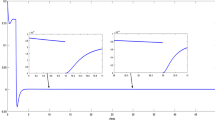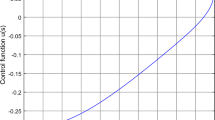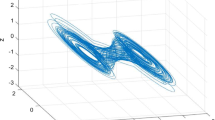Abstract
This paper investigates the finite-time stability problem for a class of discrete-time switched linear systems with impulse effects. Based on the average dwell time approach, a sufficient condition is established which ensures that the state trajectory of the system remains in a bounded region of the state space over a pre-specified finite time interval. Different from the traditional condition for asymptotic stability of switched systems, it is shown that the total activation time of unstable subsystems can be greater than that of stable subsystems. Moreover, the finite-time stability degree can also be greater than one. Two examples are given to illustrate the merit of the proposed method.




Similar content being viewed by others
References
F. Amato, M. Ariola, P. Dorato, Finite-time control of linear systems subject to parametric uncertainties and disturbances. Automatica 37(9), 1459–1463 (2001)
F. Amato, M. Ariola, Finite-time control of discrete-time linear systems. IEEE Trans. Autom. Control 50(5), 724–729 (2005)
F. Amato, R. Ambrosino, C. Cosentino, G. De Tommasi, Finite-time stabilization of impulsive dynamical linear systems. Nonlinear Anal. Hybrid Syst. 5(1), 89–101 (2011)
F. Amato, R. Ambrosino, M. Ariola, G. De Tommasi, Robust finite-time stability of impulsive dynamical linear systems subject to norm-bounded uncertainties. Int. J. Robust Nonlinear Control 21(10), 1080–1082 (2011)
R. Ambrosino, F. Calabrese, C. Cosentino, G. De Tommasi, Sufficient conditions for finite-time stability of impulsive dynamical systems. IEEE Trans. Autom. Control 54(4), 861–865 (2009)
S.P. Bhat, D.S. Bernstein, Finite-time stability of continuous autonomous systems. SIAM J. Control Optim. 38(3), 751–766 (2000)
M.S. Branicky, Multiple Lyapunov functions and other analysis tools for switched and hybrid systems. IEEE Trans. Autom. Control 43(4), 475–482 (1998)
M.S. Branicky, Stability of switched and hybrid systems, in Proceedings of the 33rd IEEE Conference on Design and Control (1999), pp. 3498–3503
D. Cheng, Controllability of switched bilinear systems. IEEE Trans. Autom. Control 40(4), 511–515 (2001)
J. Daafouz, P. Riedinger, C. Iung, Stability analysis and control synthesis for switched systems: A switched Lyapunov function approach. IEEE Trans. Autom. Control 47(11), 1883–1887 (2002)
R.A. DeCarlo, M. Branicky, S. Pettersson, B. Lennartson, Perspectives and results on the stability and stabilizability of hybrid systems. Proc. IEEE 88(7), 1069–1082 (2000)
H. Du, X. Lin, S. Li, Finite-time boundedness and stabilization of switched linear systems. Kybernetika 46(5), 870–889 (2010)
J.P. Hespanha, A.S. Morse, Stability of switched systems with average dwell-time, in Proceedings of the 38th Conference on Decision and Control (1999), pp. 2655–2660
M. Johansson, A. Rantzer, Computation of piecewise quadratic Lyapunov functions for hybrid systems. IEEE Trans. Autom. Control 43(4), 555–559 (1998)
V. Lakshmikantham, D.D. Bainov, P.S. Simeonov, Theory of Impulse Differential Equations (World Scientific, Singapore, 1989)
S.H. Lee, J.T. Lim, Stability analysis of switched systems with impulse effects, in Proceedings of the 1999 IEEE International Symposium on Intelligent (1999), pp. 79–83
D. Liberzon, Switching in Systems and Control (Brikhauser, Boston, 2003)
H. Lin, P.J. Anstaklis, Stability and stabilizability of switched linear systems: a survey of recent results. IEEE Trans. Autom. Control 54(2), 2351–2355 (2009)
X. Lin, H. Du, S. Li, Finite-time boundedness and L 2-gain analysis for switched delay systems with norm-bounded disturbance. Appl. Math. Comput. 217(12), 5982–5993 (2011)
L. Liu, J.T. Sun, Finite-time stabilization of linear systems via impulsive control. Int. J. Control 81(6), 905–909 (2008)
L. Lv, Z. Lin, H. Fang, \(\mathcal{L}_{2}\) gain analysis for a class of switched systems. Automatica 45(4), 965–972 (2009)
S. Pettersson, Analysis of switched linear systems, in Proceedings of the 42nd IEEE Conference on Decision and Control (2003), pp. 5283–5288
S. Pettersson, Controller design of switched linear systems, in Proceedings of the 2004 American Control Conference (2004), pp. 3869–3874
S. Pettersson, Synthesis of switched linear systems handling sliding motions, in Proceedings of the 2005 International Symposium on Intelligent Control (2005), pp. 18–23
Z. Sun, S.S. Ge, Switched Linear Systems: Control and Design (Springer, New York, 2005)
J. Xu, J.T. Sun, Finite-time stability of linear time-varying singular impulsive systems. IET Control Theory Appl. 4(10), 2239–2244 (2010)
X. Xu, G. Zhai, Practical stability and stabilization of hybrid and switched systems. IEEE Trans. Autom. Control 50(11), 1897–1903 (2005)
H. Ye, A.N. Michael, L. Hou, Stability theory for hybrid dynamical systems. IEEE Trans. Autom. Control 43(4), 461–474 (1998)
G.S. Zhai, B. Hu, K. Yasuda, A.N. Michel, Stability analysis of switched systems with stable and unstable subsystems: An average dwell time approach. Int. J. Syst. Sci. 32(8), 1055–1061 (2001)
G. Zong, S. Xu, Y. Wu, Robust H ∞ stabilization for uncertain switched impulsive control systems with state delay: an LMI approach. Nonlinear Anal. Hybrid Syst. 2(4), 1287–1300 (2008)
G. Zong, L. Hou, J. Li, A descriptor system approach to l 2−l ∞ filtering for uncertain discrete-time switched system with mode-dependent time-varying delays. Int. J. Innov. Comput. Inf. Control 7(5A), 2213–2224 (2011)
G. Zong, L. Hou, J. Li, Robust l 2−l ∞ guaranteed cost filtering for uncertain discrete-time switched system with mode-dependent time-varying delays. Circuits Syst. Signal Process. 30(1), 17–33 (2011)
Acknowledgements
This work was supported by the National Natural Science Foundation of China No. 60774039, No. 60974024, No. 61074089, No. 61174129, Program for New Century Excellent Talents in University No. NCET-11-0379, and the Independent Innovation Foundation of Tianjin University.
Author information
Authors and Affiliations
Corresponding author
Rights and permissions
About this article
Cite this article
Wang, Y., Wang, G., Shi, X. et al. Finite-Time Stability Analysis of Impulsive Switched Discrete-Time Linear Systems: The Average Dwell Time Approach. Circuits Syst Signal Process 31, 1877–1886 (2012). https://doi.org/10.1007/s00034-012-9403-4
Received:
Revised:
Published:
Issue Date:
DOI: https://doi.org/10.1007/s00034-012-9403-4




